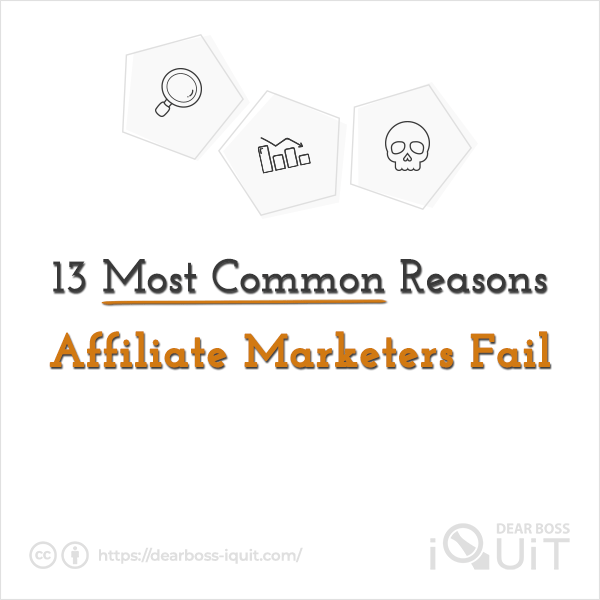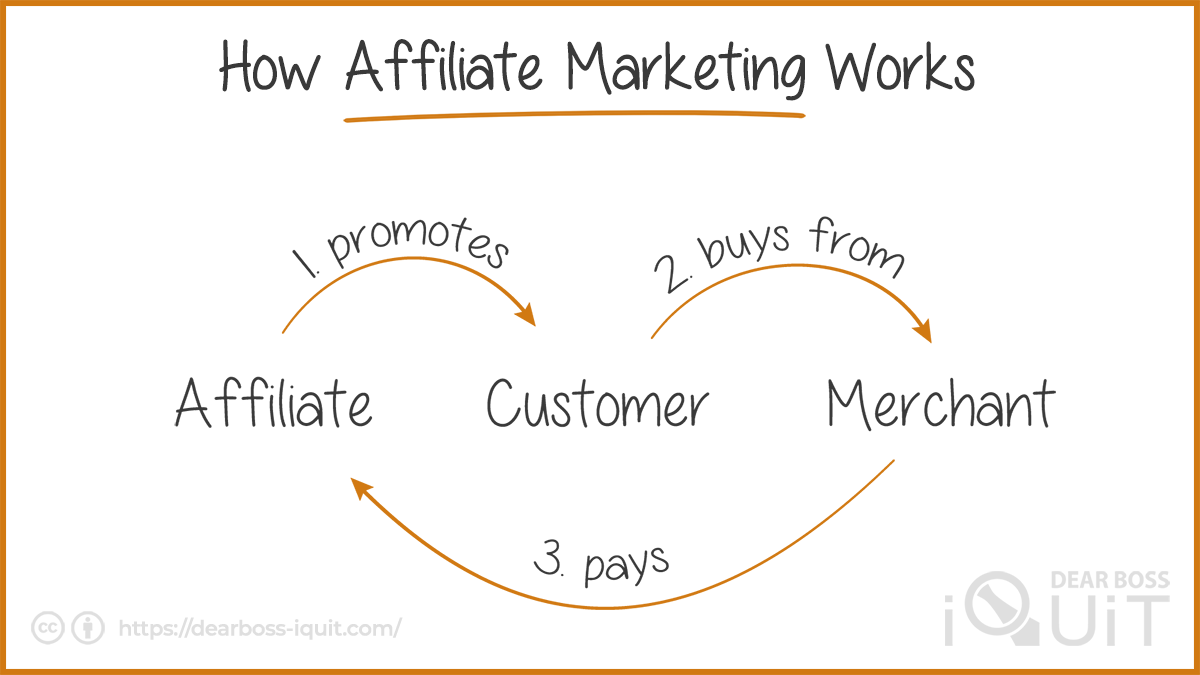Affiliate marketing is an excellent way to build a passive income online. Unfortunately, a huge portion of inexperienced affiliate marketers seems to fail shortly after venturing into the industry.
If you’ve experienced your fair share of failure in affiliate marketing and wonder what you might be doing wrong, you’re in the perfect place.
While making mistakes is pretty normal when undertaking a new activity, learning how to avoid the most common affiliate marketing pitfalls will save you lots of time, energy, and frustration and significantly increase your chances of achieving success.
That’s exactly what this article is about – outlining the 13 most common reasons aspiring affiliate marketers fail and how to counter them.
Let dive straight into it.
What Is Affiliate Marketing?
Before moving forward it’s crucial to refresh our minds on what affiliate marketing is and how it works.
Affiliate marketing is a money-making model that involves promoting products or services created and distributed by third-party online merchants in exchange for receiving a portion of the profit, or else a commission, for each customer sale generated via your marketing efforts.
In simpler words, affiliate marketers get paid commissions for referring customers to other companies.
Best Affiliate Marketing Courses
Best Affiliate Courses
How Does Affiliate Marketing Work?
Affiliate marketing can’t come being without the mutual involvement of three main players.
- Merchant
- Affiliate
- Customer
1. The Merchant
From solopreneurs to large companies, the merchant is any commercial entity that’s after reaching a wider and more diverse spectrum of potential customers by having third-party marketers promote its products or services on a commission-only basis.
Some of the largest and most well-known merchants that currently leverage affiliate marketing include, but aren’t limited to:
- Amazon
- Apple
- Sony
- Walmart
- eBay
- Etsy
- Norton
- Microsoft
- etc
2. The Affiliate
Affiliates are individuals or companies that promote other merchants’ products to people who might be interested in purchasing them in exchange for receiving a commission per sale they refer.
Commission rates can range between 1% and 75% depending on the merchant and the type of product/service promoted.
The main job of affiliates is promoting their affiliate links either by running paid ads or by creating and publishing pieces of content that appeal to their target audience throughout a variety of digital marketing channels, such as:
- Social Media
- Paid Advertising
- YouTube
- Blogging
- Email Marketing
- & more
3. The Customer
Even though the average customer is probably not aware of it, they are the driving force behind affiliate marketing. Simply put, without customers there can be no sales. And without sales, there’s no revenue to be divided between merchants and affiliates.
Customers are never subject to additional charges when they purchase products through affiliate links. On the contrary, some affiliate links contain discount codes, in which case customers pay less than they would if they made a purchase directly from the merchant.
Here’s a 7-step overview of how merchants, affiliates, and customers synergize to bring affiliate marketing into existence:
- You form an affiliate partnership with Amazon
- Amazon gives you a unique affiliate link
- You start promoting your affiliate link online (blog, social media, etc.)
- Joe clicks your affiliate link, gets redirected to Amazon’s website, and makes a purchase
- Amazon sees that Joe came to their website through your unique affiliate link
- Joe gets marked by Amazon as your referral
- Amazon credit’s you with Joe’s sale and pays you a commission
13 Main Reasons Aspiring Affiliate Marketers Fail
Countless potential errors could lead to failure in affiliate marketing. Attempting to counter all of them at once would be nearly impossible.
Start by focusing on dealing with the 13 most common ones I discuss right below.
Once you set all of them right, reevaluate your situation, figure out whether there are any other aspects of your affiliate business that require improvement, and start taking corrective actions.
1. Promoting the Wrong Products
There are millions of different products of all kinds that can be promoted via affiliate marketing. Selecting which ones you’ll be promoting wisely is what defines your performance in the affiliate business.
One common mistake many affiliate marketers make is attempting to push products that don’t fit their audience solely because they’re “popular” or pay high commissions.
The problem with such an approach is that getting people to buy irrelevant products they neither need nor want is extremely unlikely, especially in the digital world (unless you’re a phenomenal salesman).
And since as mentioned earlier, no sales equal no commissions, promoting lower-paying affiliate products that sell makes much more sense than trying to push irrelevant high-end products that no one buys.
2. Promoting Too Many Products
Another pitfall that holds many people back from becoming successful affiliate marketers, is scattering their efforts over way too many products from the get-go.
If you’re following the same course of action and you seem to be having trouble getting your affiliate venture off the ground, try focusing your promotional endeavors on just one product.
Spend time studying it, testing its features, understanding its benefits and drawbacks, and figuring out how to present your findings in such a way so that other people realize that purchasing it is in their best interest.
Once you’ve mastered the process of getting potential customers to buy your chosen product, you could start experimenting with promoting additional ones.
3. Delivering Low-Quality Content
Affiliate failure and low-quality content go hand in hand.
That’s because distributing worthless content will almost certainly hurt your credibility, diminish your conversion rates, and drive most potential customers away from your business.
On the other hand, creating highly valuable content is key to effectively converting your target audience to customers by assuring them that you’re a trustworthy expert who can answer their questions, address their concerns, and point them to the right products that’ll help them solve their problems.
Therefore, before you publish your next piece of content, make sure it’s helpful, in-depth, and well-researched, all the while delivering immense amounts of value to those who’ll be reading it.
4. Not Tracking Performance
Tracking and assessing the metrics of the affiliate processes you implement (e.g., impressions, clicks, conversion rates, etc.) is crucial to understanding how to make the necessary optimizations that would boost the performance of your business and maximize your affiliate revenue.
This can be done by using a plethora of tools such as Google Analytics, Google Search Console, Facebook Insights, Semrush, Ahrefs, Screaming Frog, etc., depending on the marketing channel you leverage towards making your affiliate promotions.
Please note that you don’t have stress over checking your metrics daily.
Conducting a monthly or bi-monthly audit of your metrics is more than enough to know whether you’ve gone off course so that you can make the right adjustments to get your business back on track.
5. Relying Only on Search Engine Traffic
Search engine traffic is the Holy Grail of acquiring a free, steady stream of potential buyers that are highly targeted and relevant to your content and the affiliate products you’re promoting within it.
That’s exactly why most affiliate marketers tend to center the bulk of their online marketing strategy around growing their search engine traffic.
However, if you’re after creating a successful, longstanding affiliate business you’ll need to employ a more holistic approach by tapping into a variety of additional traffic sources such as:
- Social Media
- Email Marketing
- Referral
- YouTube
- Forums
- etc
Diversifying your traffic generation methods in such a way is key to expanding your influence and reaching out to a wider spectrum of potentially untapped audiences that might be extremely interested in purchasing whatever you’re promoting.
6. Neglecting Search Engine Optimization (SEO)
At the opposite end of the spectrum, many affiliate marketers completely disregard optimizing their blog content for the search engines.
According to a report published by BrightEdge, SEO is the dominant and most effective source of web traffic, driving up to 1000% more visitors and 300% more revenue than other marketing channels.
Taking into account those numbers, if you’re currently conducting your affiliate promotions through blogging, neglecting SEO could be detrimental to the overall success of your affiliate business.
7. Endorsing Low-Quality Products
If you can’t seem to be able to make your affiliate business work, one of the first things you need to take a serious look at is the quality of the products you’re endorsing.
Over the years I’ve been involved in affiliate marketing I’ve seen hundreds of publishers promoting low-quality products just because they pay generous commissions.
That’s not the way to go.
Even though promoting useless products could yield a few commissions here and there, at the same time, it slowly eats away the reputation and trustworthiness of your entire affiliate business.
Think about it. If someone convinced you to purchase an awful product would you trust them ever again?
Probably not.
Would you try to avert other people from trusting them?
Probably yes.
That’s exactly why instead of promoting a product solely based on its high commission rates, you should also always ensure that it has the potential to genuinely benefit your audience.
Trust me, promoting a high-quality product will deliver considerably higher long-term returns than promoting a crappy one, even if it yields much lower commissions per sale.
Lastly, always keep in mind that reputable products convert much more effortlessly than products with a lot of negative or no reputation at all.
It’s no secret that almost every single buyer on the face of this planet would rather purchase a 4-star product over its 1-star counterpart, any day of the week.
8. Targeting Highly Competitive Keywords
If search engines seem unwilling to favor your content even though you’ve been consistently blogging for a while, you might be putting your eggs in the wrong basket by centering your blog posts around keywords targeted by seasoned competitors.
Getting a new affiliate blog to occupy a search engine spot that receives a decent amount of traffic for such keywords is nearly impossible, giving you no chance to have anyone lay eyes on your content, let alone your affiliate links.
That being said, if you’re a beginner to affiliate marketing, make sure that you steer clear of keywords covered by well-established competitors that could easily outrank smaller affiliate blogs with no authority like yours.
The less competitive a keyword is, the higher your odds of ranking well for it.
A couple of tools you can leverage towards determining the demand, competitiveness, and ranking difficulty of any given keyword are KWFinder, SEMRush, and Ahrefs.
9. Being Impatient
Even though affiliate marketing is among the simplest money-making models out there, achieving success with it still involves a steep learning curve, immense amounts of upfront work, and tons of trial and error over a significant timeframe that could span several years.
If you lack the patience or willingness to endure such a challenging and lengthy process, you’re never going to make it as a successful affiliate marketer.
10. Not Utilizing Email Marketing
Despite its old origins, email marketing is still one of the most effective digital marketing channels, yielding an average ROI (Return on Investment) of 3600%.
This means that an email marketing campaign can bring in an average of $36 for every dollar you invest in running it.
No other form of marketing, digital or otherwise, delivers such a high ROI.
If you’ve yet to start marketing your affiliate links via email, you’re leaving a lot of money on the table.
11. Selling Rather Than Helping
Another huge mistake that keeps many affiliate marketers back from reaching success is fixating on selling.
Since as an affiliate marketer you get paid on a per-sale basis, trying to generate as many affiliate sales as possible is understandable.
However, as counterintuitive as it might sound, the more your affiliate business gears towards selling, the fewer sales you’ll be making.
The days that such practices were effective are thankfully, long gone.
Nowadays, affiliate success is a game of value, not sales.
As long as you educate your target audience with valuable and relevant information about the problems the products you promote solve, sales will flow in naturally.
Always keep in mind that people don’t buy products, they buy help to solve their problems.
As such, if you’re after becoming an affiliate marketing success story, ensure that you always prioritize helping over selling.
12. Not Having An Affiliate Blog
Affiliate marketing can be done on dozens of different marketing channels, such as:
- Social Media
- Paid Ads
- YouTube
- Forums
- etc
However, no marketing approach is as beneficial and effective for building a thriving, lasting online business as running an affiliate blog.
As opposed to brands that don’t leverage blogging, the ones that do,
- Acquire a wider spectrum of potential buyers
- Develop a unique voice that helps them stand out from their competitors
- Appear much more professional, credible, and trustworthy
- Experience higher customer engagement rates
- Are recognized as established thought leaders in the field they operate
- Attract an average of 67% more leads per month
- Have anywhere between 1% and 5% higher conversion rates
If you’re currently not operating an affiliate blog, I strongly advise you to launch one ASAP by checking out our illustrated guide on Creating an Affiliate Blog in 6 Simple Steps.
13. Lack of Proper Guidance
According to statistics, lack of proper training is the #1 reason that aspiring affiliate marketers fail.
That’s completely understandable.
Becoming a successful affiliate marketer is no walk in the park. As mentioned earlier, the journey to affiliate success involves a steep learning curve, massive amounts of work, and tons of trial and error.
Venturing into such a journey without having the right guidance would be like walking blindly in a minefield. It will not only significantly hinder your progress but annihilate the chances of reaching your financial goals.
If you want to stand a chance of not having your affiliate business tank, you need to seriously consider signing up for a high-quality, structured affiliate marketing course that’ll point you in the right direction and help you sidestep all the major pitfalls that lead to failure in the industry.
Affiliate marketing FAQs
Affiliate marketing is an online business model that involves promoting products or services created and distributed by third-party online merchants in exchange for getting paid a commission for each sale you refer.
In layman’s terms, affiliate marketing is the process of being compensated for helping businesses sell to more customers.
Here’s a bird’s eye view of how affiliate marketing works.
- You join a merchant’s affiliate program
- The merchant gives you a unique affiliate link that points to their e-shop
- You promote your unique affiliate link online (blog, forums, social media, paid ads, etc.)
- Every time someone clicks on your unique affiliate link and makes a purchase on the merchant’s e-shop, the merchant pays you a commission
There are thousands of successful affiliate marketers all around the world. Some of the most well-known ones are:
- Pat Flynn
- Matt Diggity
- Matthew Woodward
- Doug Cunnington
- & more
You can check out a roundup of my 17 favorite examples of affiliate success and their backstories right here.
- Billion-dollar industry
- Very low startup & operational expenses
- Huge income potential
- Flexible & versatile
- Passive income
- Simple to implement
- No technical background
- No customer support
- No physical setup
Affiliate marketers can be divided into five main income groups:
- Total beginners: $0 – $20,000 per year
- Low-level affiliates: $20,000 – $50,000 per year
- Intermediate affiliates: $50,000 – $100,000 per year
- High-level affiliates: $100,000 – $500,000 per year
- Super affiliates: $500,000+ per year
According to PayScale, the average annual income for affiliate marketers in the US is over $54,000 per year. Statistics reveal that 13% of affiliates earn more than $75,000 per year.
Some of the factors that influence how much you earn as an affiliate marketer include:
- seniority
- target niche
- available resources
- previous experience
- marketing efforts
- & overall mindset
Here’s a rough income growth timeline of a typical affiliate marketing business:
- months (0-3): no earnings
- months (3-6): first affiliate sale
- months (6-12): $100-$500 monthly
- months (12-18): $1000 monthly
- months (18-24): $3000+ monthly
This timeline isn’t a guarantee of future performance but rather a mere approximation of the income growth of an average affiliate business. Your own timeline could be shorter or longer than projected.
Over the years, I’ve seen aspiring affiliates striking a gold vein just a few months into the industry. On the other hand, I personally know people who’ve been struggling to grow their affiliate revenue to $1000 per month for several years.
Affiliate marketing is one of the most affordable money-making models out there.
Here’s a breakdown of everything you need to get started as an affiliate marketer along with their associated costs:
- web hosting & domain name: $2.95/month (Bluehost)
- keyword research tool: $49/month (Jaaxy)
- expert guidance: $49/month (Wealthy Affiliate)
- email autoresponder: Free for up to 1000 subs (MailerLite)
Please note that on top of expert guidance, Wealthy Affiliate also provides free access to hosting and a keyword research tool so you don’t have to purchase them separately.
Yes, you can do affiliate marketing without a website by promoting your affiliate links on other marketing channels, such as:
- Social Media
- Paid Ads
- YouTube
- Podcast
- etc.
The process of getting started with affiliate marketing can be broken down into the following four simple steps:
- Pick a niche
- Launch a blog
- Build an audience
- Promote affiliate products
No, you don’t.
Affiliate marketing is very simple to get started with by virtually anyone regardless of age, education, background, available capital, tech-savviness, professional network, etc.
In fact, most 6-figure affiliate marketers were no more experienced than you currently are when they first ventured into the affiliate marketing industry.
Nonetheless, being knowledgeable in fields like marketing, sales, content production, business management, etc., could help you reach your financial goals somewhat faster.
Conclusion
Understanding why affiliate marketers fail is crucial to identifying the exact mistakes you need to avoid making to ensure that you won’t end up suffering a similar fate.
Now that you’re aware, make sure that you start putting all your newfound knowledge into practice ASAP and I promise you that your failing affiliate business will start turning around in no time.
Always keep in mind that even though affiliate marketing might seem simple in theory, becoming successful in it is no walk in the park, especially without decent guidance.
As such, if you’re serious about building a prosperous, long-lasting affiliate business, investing in a high-quality affiliate course is a MUST.
If you have any questions or require further help, I encourage you to leave a comment right below or contact me right here, and I’ll do my best to get back to you as soon as possible.
Best of luck in your affiliate endeavors!
Harry, Founder & Creative Director at dearboss-iquit.com





